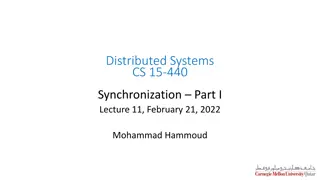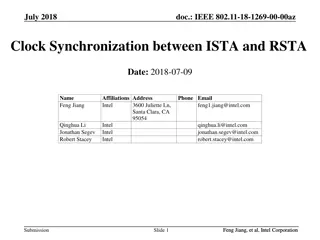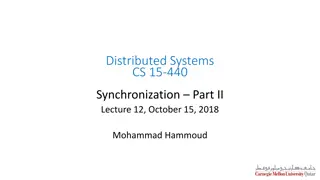Regional Business Cycle Synchronization in Greece
This funded research project aims to analyze the drivers of regional business cycle synchronization in Greece using NUTS 2 classification. The study will provide valuable insights for policy making at both national and regional levels, focusing on key characteristics of regions driving the Greek reference cycle.
Download Presentation

Please find below an Image/Link to download the presentation.
The content on the website is provided AS IS for your information and personal use only. It may not be sold, licensed, or shared on other websites without obtaining consent from the author.If you encounter any issues during the download, it is possible that the publisher has removed the file from their server.
You are allowed to download the files provided on this website for personal or commercial use, subject to the condition that they are used lawfully. All files are the property of their respective owners.
The content on the website is provided AS IS for your information and personal use only. It may not be sold, licensed, or shared on other websites without obtaining consent from the author.
E N D
Presentation Transcript
Description of the funded research project 1st Call for H.F.R.I. Research Projects to Support Faculty Members & Researchers and Procure High-Value Research Equipment
Title of the research project: Drivers of Regional Business Cycles Synchronization in Greece Principal Investigator: Dr. Stavros Degiannakis Reader-friendly title: Regional_BCS Scientific Area: Social Sciences Institution and Country: Panteion University, Greece Host Institution: Panteion University of Social and Political Sciences Collaborating Institution(s): University Research Institute of Urban Environment and Human Resources Budget: 113.740 Project webpage (if applicable): Under Construction Duration: 36 months 2
Research Project Synopsis The aim of the project is to extend the within-country business cycle synchronisation research work and to indentify and analyse the drivers of regional business cycles synchronisation in Greece using NUTS 2 classification. The objectives of the project to fulfil its aims are defined in the following set questions: 1. How synchronised are the regional business cycles vis- -vis the aggregate national reference cycle? 2. Are any regions that drive the Greek reference cycle or the reverse? If yes, which are the key characteristics of those regions? 3. How synchronised are the regional business cycles? 4. Which are the key drivers of regional business cycle synchronisation? 5. What can the lagging regions be taught by the leading regions? 6. Could policy measures be leaned towards to bottom-up than to top-down development model? The project will evaluate, on the grounds of its findings, the pre-crisis and current regional policies and will provide valuable information and future policy recommendations for policy designing and policy making at national and regional level. This study complements and enhances the existing line of applied research by focusing on Greek regions, and by extending the list of business cycles synchronisation potential national and local drivers. More specifically, apart from the intra-regional trade, industry dissimilarity index, distance between capital cities and size of each region, the study will consider dissimilarities in employment, distance between regions capital cities and the main trade infrastructure (such as airports or ports), disparities in savings rates and in public financing for infrastructure (fiscal transfers from central government to each region). 3
Project originality The key innovations of the study are threefold: (i) the unique dataset/database, at national and regional level, that will be constructed during the project s life; (ii) the modelling framework which will allow the investigation of the time-varying synchronisation among the Greek regions; and (iii) the focus on Greece, a country not only been suffering from the long on- going debt crisis, but also been characterized by unique economic and geospatial characteristics. It is important to note that the current project is directly related to the EU s regional policy, i.e., the Cohesion Policy , which aims to reduce the regional inequalities across all EU regions. The Cohesion Policy with a budget of 351.8 billion for the period 2014-2020, aims at creating jobs, improving competitiveness and quality of life and leading to a sustainable development for all EU regions. Furthermore, the project s aim and objectives are very close to Greek policy makers interests and priorities, given the country s unique economic geography and its socio-economic challenges faced with, at national and regional level, on its way out of crisis. Greece comprises of few urban regions, a large number of mountainous regions and island economies. Even more, there are wide disparities among the Greek regions due to their varying economic structures (i.e., industrialised regions such as Attika, agricultural regions such as Thessaly and/or tourism-oriented regions such as South Aegean). It should be borne in mind that the proposed time varying methodological framework is the most appropriate, due to high level of disparities among the Greek regions, for modelling the level of business cycle synchronisation, because it allows to be incorporated into the entire framework the time varying regional structures. 4
Expected results & Research Project Impact The project s overall impact targets at two wide groups: a) policy makers at country and EU level and b) local communities. Its major objective is to identify, analyse the key endogenous and exogenous drivers, such as employment, gross fixed capital formation, fiscal transfers, industry structure, and estimate their impact on regional business cycle synchronization over time. More precisely: Impact on the local community: Local Authorities will widen their horizons experiencing different cultures and building a better understanding of the EU development policies, thus being able to initiate more concrete plans on supporting their local economies. Impact at national level: At a national level this project will allow among others the identification of links between regional heterogeneity and resilience at regional level which has been one of the core issues regarding the geography of the crisis effects and vehicles out of crisis. Impact at EU level: At the EU level the impact of the project will take the form of networking with other regions/countries by sharing the results through conferences, publications and workshops. The project s findings are expected to have major and wide impact: in understanding what does and does not drive the economic development and growth of the Greek regions, on the rethinking of policy making and measures to be adopted and implemented, on the improvement of the efficient allocation of resources/investments, on the improvement of competition of local and national economy with important implications for employment and income, as well as on the sustainability of regions and Nations development. In other words, the impact/contribution of the proposed research and its findings to the Greek economy at local, regional and national level is very significant. 5
The importance of this funding The funding of the research project is of vast importance for our research team since it will have a significant value added to future research by Doctoral candidates and other academic researchers in the field of applied social sciences with focus to economics, regional economics and development. The funding will help us develop a modeling framework which will challenge the scientific society of applied economics and applied econometrics in terms of application and possible improvements. An expected challenge is How to recognize accurately potential variation of regional business cycle synchronization over time , which will incorporate significant evidence to recent literature. Last but not least, the set questions to be examined and the findings of the project will provide the start of the opening of a cycle in terms of more in depth research in the area of regional business cycle synchronization. 6
COMMUNICATION 185 Syggrou Ave. & 2 Sardeon St. 2 171 21, N. Smyrni, Greece +30 210 64 12 410, 420 communication@elidek.gr www.elidek.gr 23.07.2019























